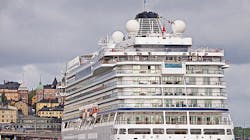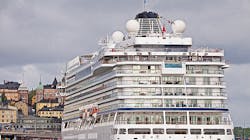Wastewater discharge to be banned from passenger ships into Baltic Sea
HELSINKI, Finland - By 2021 passenger ships will be prohibited from discharging wastewater into the Baltic Sea special area and will have to offload sewage at port reception facilities (PRFs).
The decision is seen as a major milestone over 35 years of work to improve facilities and reduce sewage emissions from ships in the region.
Under the MARPOL Convention, the International Maritime Organization (IMO) agreed that this change would take effect for IMO registered passenger vessels.
The decision means that by 2021 all IMO registered passenger vessels sailing in the Baltic Sea, as the first region in the world, must discharge all sewage at PRFs, or treat it with an on-board treatment plant certified to meet stringent special area requirements.
For new ships built on or later than 2019, these requirements will apply earlier.
The significant outcome concludes the long HELCOM process aiming to limit sewage discharges in the Baltic Sea from passenger vessels, as the emissions have negative impact on the marine environment.
The decision was made during the meeting of the IMO Marine Environment Protection Committee (MEPC) that ended in London last week.
The proposal to designate the Baltic Sea as a special area for sewage within MARPOL Annex IV was developed by the HELCOM Maritime Working Group, which is made up of maritime administrations of the Baltic Sea coastal countries and the EU.
This proposal was submitted to IMO MEPC by the coastal countries in 2010, following a decision by the 2007 HELCOM Ministerial Meeting in Cracow, Poland.
Based on the submission the Baltic Sea was designated by IMO as a special area for sewage in 2011. However, according to the IMO decision this status would only take effect once the coastal countries informed IMO that adequate Port Reception Facilities are available in the region.
By the time of the IMO meeting last week, all Baltic coastal countries had sent confirmation of adequate reception facilities in Baltic ports, as a result of substantial work on port reception facilities for wastewater and their use in the Baltic Sea area by national administrations, ports and the passenger ship industry.
The momentum to submit a proposal to designate the Baltic Sea as a sewage special area comes from the fact that standards for, and implementation of, sewage treatment on the shore in the Baltic Sea region have been tightened considerably during the last decades.
The Nitrogen and Phosphorus contained in ship sewage aggravate the eutrophication of the Baltic Sea, HELCOM said.
Already at the first meeting of the Helsinki Commission, or HELCOM, in 1980, the coastal countries adopted regional Recommendations targeting sewage from passenger ships, concerning both port reception as well as on-board treatment plants.
###
Ballast backlash: Is IMO ratification helping or hindering technology?
Ballast water treatment market remains buoyant
Ballast water treatment system contract awarded to Wartsila in China

